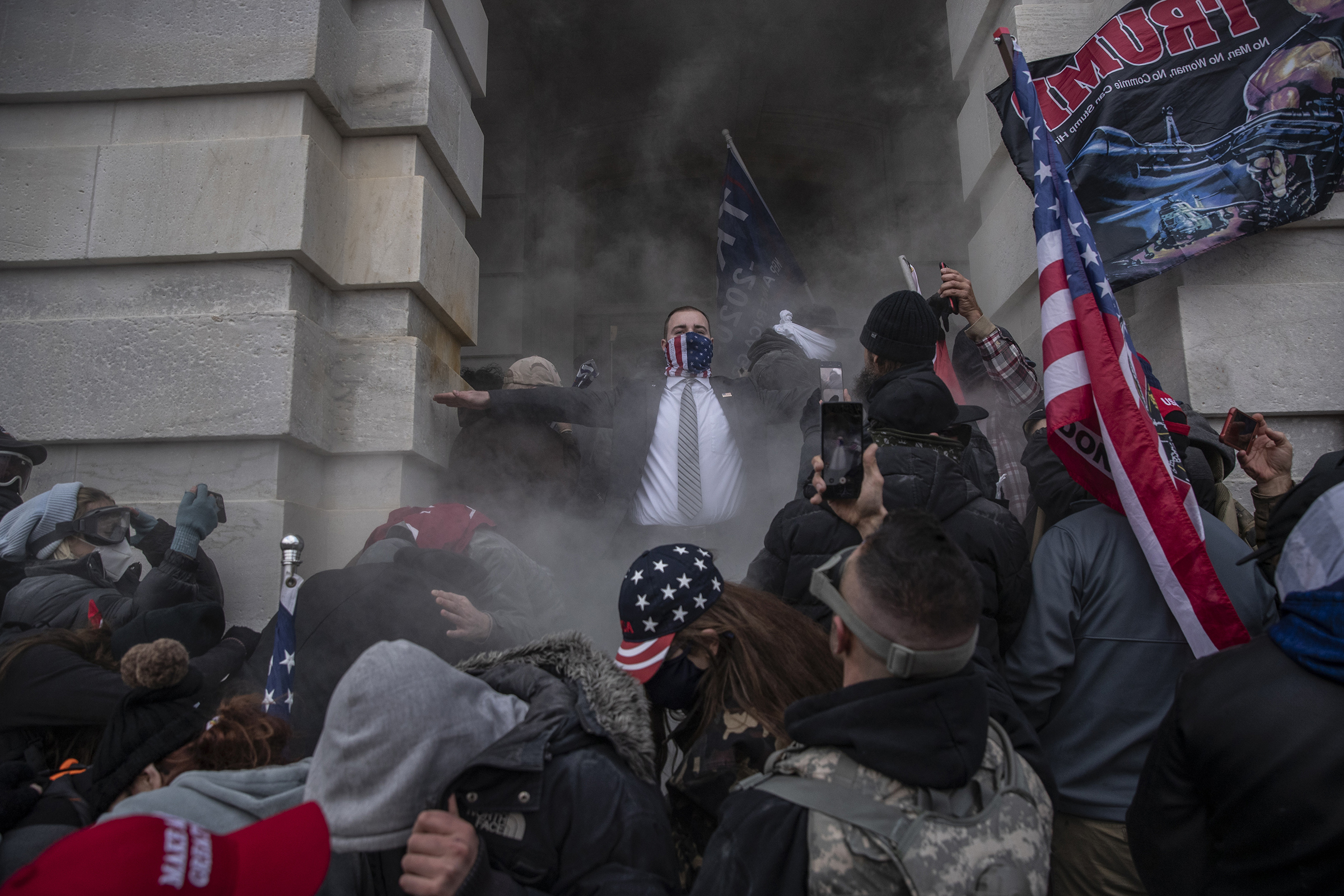
In the most high-profile Jan. 6 case yet, the founder of the far-right Oath Keepers militia and four other members are facing charges of seditious conspiracy in a significant test for the Justice Department, which is seeking to successfully prosecute the rare charges for the first time in 30 years.
Stewart Rhodes, the leader of the Oath Keepers, and 10 fellow members of the group are alleged to have conspired to use force to prevent the certification of President Joe Biden’s electoral victory. The charge carries up to 20 years in prison. Jury selection began on Sept. 27, with opening arguments currently slated to start next week. The trial is expected to last more than a month. A second trial for the remaining co-defendants is scheduled for November.
Here’s what to know about the case.
What will the prosecutors argue?
As they cast the Jan. 6 assault on the U.S. Capitol as an attack on American democracy, prosecutors will be able to draw on the extensive documentation of the attack, including thousands of hours of footage. They are also likely to point to Rhodes’ call for an armed “civil war” to keep former President Donald Trump in power.
READ MORE: For the Oath Keepers and Proud Boys, Jan. 6 Was Just the Start
Prosecutors allege that members of the Oath Keepers organized, trained, and equipped themselves months before Jan. 6, 2021. “We aren’t getting through this without a civil war. Too late for that. Prepare your mind, body, spirit,” Rhodes privately messaged a group of Oath Keepers in an encrypted app on Nov. 5, according to his indictment.
On Jan. 6, the group of Oath Keepers went to the Capitol ready “to answer Rhodes’ call to take up arms,” according to the indictment. They coordinated their actions on that day using encrypted messaging apps, hand signals, and walkie-talkies, and several were photographed wearing tactical vests, helmets, and other equipment as they breached the doors of the Capitol Rotunda.

What will the defense argue?
The rare charges are expected to be met with an even rarer defense. Rhodes’ lawyers have indicated they will argue that he believed Trump was going to lawfully invoke the Insurrection Act, a 1807 statute that allows the president to call up militias in the case of national emergencies.
“What the Government contends was a conspiracy to oppose United States laws was actually lobbying and preparation for the President to utilize a United States law to take lawful action,” Phillip Linder and James Bright, Rhodes attorneys, argued in a court filing.
READ MORE: Inside One Combat Vet’s Journey From Defending His Country to Storming the Capitol
Who is Stewart Rhodes?
A 57-year-old former Army paratrooper and Yale Law School graduate, Rhodes founded the Oath Keepers in 2009. He focused on recruiting current and former military and law enforcement officers into the self-styled militia, which encouraged members to consider themselves as “the last line of defense against tyranny,” according to Oath Keepers recruiting materials.
The motto of the organization (“not on our watch”) as well as its informal slogan, “Guardians of the Republic,” emphasize the idea that members of the Oath Keepers are being called on to defend the country against a perceived threat. A roster of 38,000 members, which leaked last fall, revealed dozens of elected officials as well as large numbers of police officers, sheriffs and military in the group’s ranks.
Prosecutors have alleged that Rhodes and fellow Oath Keepers’ ultimate aim is to undermine the U.S. government, which they see as having been “coopted by a cabal of elites actively trying to strip American citizens of their rights,” in the words of one indictment.
What are the stakes of the trial for the government?
If prosecutors fail to win a conviction in the highest-profile case emerging from the insurrection, it could undermine the Department of Justice’s argument that the Jan. 6 attack was a serious attack on American democracy, which Trump and his supporters have contested.
In the past 20 months, more than 900 people have been charged with various crimes for attempting to interfere with Congress’ certification of Biden’s victory. Nearly 400 people have pleaded guilty thus far in connection with the attack on the Capitol, which ultimately left five people dead and scores injured.
READ MORE: The Capitol Attack Was the Most Documented Crime in History. Will That Ensure Justice?
But none of those cases have involved charges this serious. The last time the Justice Department tried to prosecute seditious conspiracy was in 2010, when it accused members of the Hutaree militia in Michigan of an alleged plot to incite an uprising against the government. A judge dismissed the case, citing insufficient evidence of conspiracy. The last time seditious conspiracy was successfully prosecuted was in the 1990s, when Islamic extremists were convicted of the charge for plotting to bomb several New York City buildings, including the United Nations.
The trial is also significant because the Biden Administration has repeatedly emphasized the threat posed by groups like the Oath Keepers, and made combating the groups a key part of their strategy to fight domestic extremism.
A “key component of the threat comes from anti–government or anti–authority violent extremists,” says a strategy document issued by the National Security Council last summer. “This includes self–proclaimed ‘militias’ and violent extremists who take steps to violently resist government authority or facilitate the overthrow of the U.S. Government based on perceived overreach [and] sovereign citizen violent extremists, who believe they are immune from government authority and laws.”
The outcome of the case could determine the Oath Keepers’ future and that of similar groups. Since the events of Jan. 6, 2021 and the arrests and charges that followed, many of the Oath Keepers and their supporters have cast themselves as victims of political persecution by a tyrannical federal government. They have also used their notoriety to draw attention to anti-vaccine protests, political rallies and in support of gun rights initiatives.
About 35% of the more than 900 people charged in the assault on the Capitol had links to extremist groups and movements, according to an analysis by the National Consortium for the Study of Terrorism and Responses to Terrorism at the University of Maryland.
More Must-Reads from TIME
- Donald Trump Is TIME's 2024 Person of the Year
- Why We Chose Trump as Person of the Year
- Is Intermittent Fasting Good or Bad for You?
- The 100 Must-Read Books of 2024
- The 20 Best Christmas TV Episodes
- Column: If Optimism Feels Ridiculous Now, Try Hope
- The Future of Climate Action Is Trade Policy
- Merle Bombardieri Is Helping People Make the Baby Decision
Write to Vera Bergengruen at vera.bergengruen@time.com